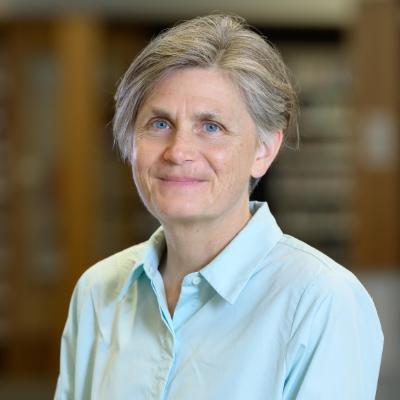Deborah Eastman
Associate Dean of the Faculty
Professor of Biology
Joined Connecticut College: 2003
Education
Ph.D., University of Minnesota
Post-doctoral fellowships, Institute of Molecular Biology and Biochemistry, Greece, and Yale University
Molecular biology
Genetics
Microbiology
Deborah supports department chairs on the hiring of visiting and adjunct faculty and coordination of visiting committees for departmental 10-year reviews and self studies. She is responsible for tracking sabbatical eligibility and supporting the Committee on Faculty Compensation (CFC) in reviewing sabbatical requests. Deborah oversees faculty funding and professional development opportunities through the R.F. Johnson Faculty Development Fund, Susan Eckert Lynch ’62 Faculty Research Fund, the Elizabeth McGuire and Anthony T. Enders Fund, and the Research Matters Fund. She serves on the Academic Administrative Procedure Committee (AAPC) and the Facilities and Land Management Committee (FLMC) and convenes the Calendar Committee as well as the New Faculty Orientation Committee.
Deborah Eastman is interested in the conversations that cells have during embryonic development. In her research, Eastman uses cellular, computational, genetic, and molecular approaches to study the signaling pathways and transcriptional regulatory mechanisms that are critical to cell specialization.
Her doctoral dissertation and resulting publications explored the intercellular signaling that occurs in the myxobacteria as they undergo fruiting body formation and sporulation. As a post-doctoral researcher at Yale University and at the Institute for Molecular Biology and Biotechnology on Crete, Greece, she studied functions of the Notch signaling pathway during nervous system development in the fruitfly, Drosophila melanogaster.
Understanding the molecular mechanisms underlying development is interesting on its own, but it also has a wider application to human health. The Notch pathway has been conserved from worms to humans and altered forms of Notch pathway proteins result in human diseases such as tumors, stroke and dementia (CADASIL), Alzheimer's Disease and Allagilles Syndrome. Dr. Eastman and other researchers in this field hope that possible cures may be found for these diseases by studying the function of this pathway in model organisms that are amenable to molecular and genetic experimentation.
Research in Eastman’s laboratory has focused on understanding the transcriptional regulation of Notch pathway target genes that are required for specifying cell types during Drosophila development. She and her students have used bioinformatic, genetic and molecular approaches to identify potential co-regulators of Notch target genes during Drosophila sensory organ development. Recently, Eastman shifted her focus on Notch and transcriptional regulation in flies to a new model organism, the Mexican salamander, *Ambystoma mexicanum*, otherwise known as axolotl. Specifically, she is studying the signaling pathways and molecules involved during taste bud development in axolotls. Her lab recently published a genome-wide study using RNAseq to identify potential genes involved in taste cell differentiation in axolotls.
Professor Eastman fuses her passion for biology and her expertise in cell, genetic and molecular biology research with her commitment to teaching and mentoring undergraduates. She is committed to equitable and inclusive teaching in order to inspire and engage all students to reach their full potential. As a teacher she strives to accomplish a number of goals in her courses and in her guidance of undergraduate research: to engage students in the process of scientific discovery while learning and applying concepts, to develop communication, problem-solving and quantitative skills, to personally convey her enthusiasm for the study of biological processes by presenting the material she is teaching in a creative manner, and to promote students to think about the social and ethical issues involved within the fields of developmental biology and genetics.
During the past several years Professor Eastman has been a co-coordinator for Full Participation and a Divisional Fellow in the Center for the Critical Study of Race and Ethnicity (CCSRE). In these roles she co-led the development of the new Social Difference and Power curricular requirement at the College and organized events for the CCSRE: STEM partnership on the theme SYZYGY. SYZYGY programming generated an open discussion of scholarly work that undertakes critical examinations of race, ethnicity, and social difference in relationship to science and math.
She teaches Developmental Biology, Genetics and Cell Signaling courses.
Contact Deborah Eastman
Mailing Address
Deborah Eastman
Connecticut College
Box # BIOLOGY/New London Hall
270 Mohegan Ave.
New London, CT 06320
Office
421 New London Hall
